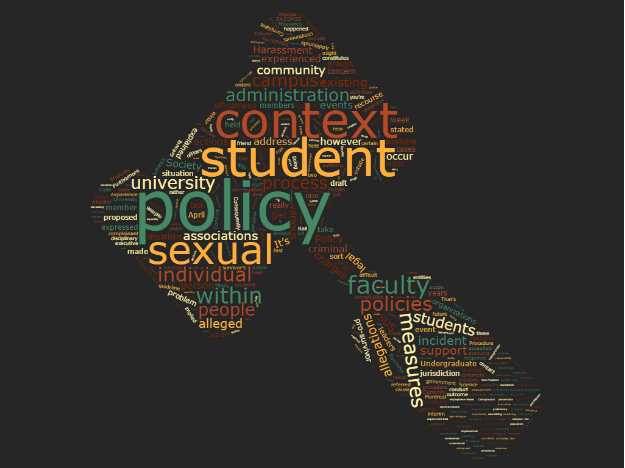Having missed the Jan. 1 deadline set by the Quebec government to revise its sexual violence policy, McGill’s revisions, which are scheduled to be introduced to the Senate on Feb. 20, have become a point of contention between students and staff since last month’s meeting. When the Ad-Hoc Senate Committee on Teaching Staff-Student Intimate Relationships presented their findings at the Dec. 5 Senate meeting, around 25 students attended to protest the report for not suggesting that the Senate enact a full ban on consensual sexual relationships between students and their instructors. After the report’s presentation and a heated question period between student senators and Associate Provost (Equity and Academic Policies) Angela Campbell, students began chanting “We want a ban!” The Senate’s chairwoman, Principal and Vice-Chancellor Suzanne Fortier, asked the students to stop.
“I think we’ve all heard you,” Fortier said. “You don’t have to repeat that twenty times. At this time, I will ask you to respect our work and the need for us to continue in our proceedings.
Teaching staff-student relationships constitute any consensual romantic or sexual relationship between a student and a staff member with teaching, supervisory, or grading authority over any student. Convened last semester, the committee was made up of three students and three academic staff members, or two alternate student members if others were not present. The committee’s report recommends that staff-student relationships be prohibited between members of the same academic unit. However, staff may ask for an exemption if they would have no supervisory authority over the student, and the student is not perceived as having any advantage over their peers.
The three student members of the committee wrote a commentary in The McGill Tribune in December 2018, stating that the report ignored student demands for a ban on all staff-student relationships. Bee Khaleeli, a committee member who also contributed to SSMU’s Gendered and Sexual Violence Policy, said that the report is yet another example of McGill ignoring its students.
“In the conversations [the committee] had, both in private and during public forums, it was clear that students wanted a ban,” Khaleeli said. “I personally don’t feel that this was something that was addressed in good faith. I think that [the proceedings] pointed not only to McGill’s failure to [address] this specific issue, but also to a wider pattern of students’ needs not being taken seriously.”
The committee was tasked with holding its meetings on a consensus basis, meaning that the recommendations within the report had to be agreed upon by all committee members. After the report was presented to the Senate, Students’ Society of McGill University (SSMU) senators questioned why students’ request for a ban was omitted. Arts Senator Madeline Wilson denied the existence of a consensus, sparking a debate between herself and Campbell.
“The three students on that committee clearly stated that they were in favour of a ban on staff-student relationships, and that wasn’t represented anywhere in the report,” Wilson said. “[The claim] that the goal of consensus-based decision making is compromise is not [realistic]. [Compromise] is not something that should be considered with regards to an issue of this sensitivity or with an issue that relates to student safety.”
Campbell cited the findings of Concordia’s Sexual Assault Policy Review Working Group, which found that banning any relationship between consenting adults would be illegal. Campbell also adamantly stated that McGill’s administration is trying its best to incorporate student opinions into the discussion about sexual violence at McGill.
“Having the outcome that you would like to see not appear in the result of a report doesn’t mean that you weren’t heard,” Campbell said. “I think there’s a difference between being consulted and having your opinion carry the day […], otherwise, [the report] would be a single-person show [….] I think there’s a disconnect between the perception of how much interest the university has taken toward this issue versus how many resources are actually being poured into both addressing these issues as well as preventing them.”







